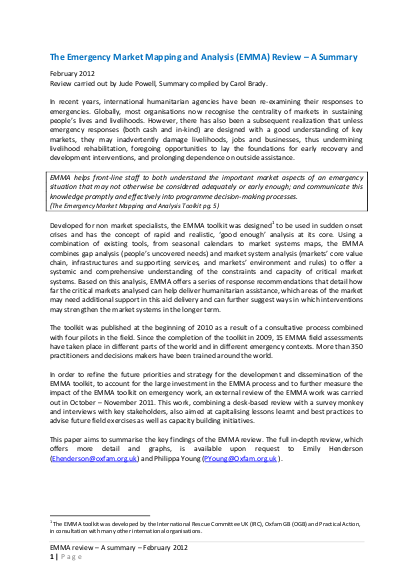
Developed for non market specialists, the EMMA toolkit was designed to be used in sudden onset crises and has the concept of rapid and realistic, ‘good enough’ analysis at its core. Using a combination of existing tools, from seasonal calendars to market systems maps, the EMMA combines gap analysis (people’s uncovered needs) and market system analysis (markets’ core value chain, infrastructures and supporting services, and markets’ environment and rules) to offer a systemic and comprehensive understanding of the constraints and capacity of critical market systems. Based on this analysis, EMMA offers a series of response recommendations that detail how far the critical markets analysed can help deliver humanitarian assistance, which areas of the market may need additional support in this aid delivery and can further suggest ways in which interventions may strengthen the market systems in the longer term.
The toolkit was published at the beginning of 2010 as a result of a consultative process combined with four pilots in the field. Since the completion of the toolkit in 2009, 15 EMMA field assessments have taken place in different parts of the world and in different emergency contexts. More than 350 practitioners and decisions makers have been trained around the world.
In order to refine the future priorities and strategy for the development and dissemination of the EMMA toolkit, to account for the large investment in the EMMA process and to further measure the impact of the EMMA toolkit on emergency work, an external review of the EMMA work was carried out in October – November 2011. This work, combining a desk-based review with a survey monkey and interviews with key stakeholders, also aimed at capitalising lessons learnt and best practices to advise future field exercises as well as capacity building initiatives.
This paper aims to summarise the key findings of the EMMA review. The full in-depth review, which offers more detail and graphs, is available upon request to Emily Henderson (Ehenderson@oxfam.org.uk) and Philippa Young (PYoung@Oxfam.org.uk ).
Resource collections
- Evaluating humanitarian action
- Innovation
- Monitoring and Evaluation (M&E)
- Monitoring of humanitarian action
- UN Habitat - Urban Response Collection
- Urban Response - Urban Crisis Preparedness and Risk Reduction
- Urban Response Collection - Community Engagement and Social Cohesion
- Urban Response Collection - Economic Recovery
- Urban Response Collection - Environment and Climate Change
- Urban Response Collection - Housing, Land and Property
- Urban Response Collection - Urban Crisis Response, Recovery and Reconstruction
- Urban Response Collection - Urban Resilience
- Use of evaluation evidence
